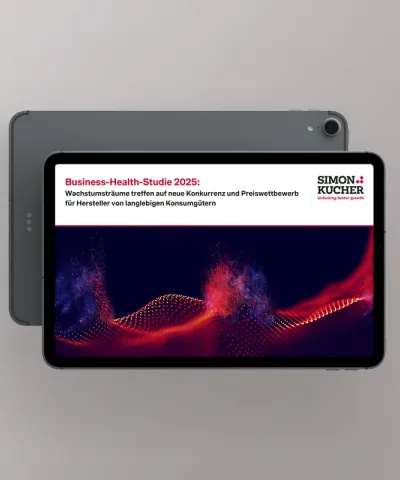Online car purchases, car data sharing, electric vehicles, autonomous driving: There are several transformational trends going on in the automotive industry. So how do consumers feel about them? In our new global study, we asked them:
As new mobility concepts become more common, the way we move through the world is changing more and more. How accepting are consumers of these changes? What do they think about ongoing and emerging trends in the automotive sector? To find out, we conducted the Simon-Kucher Automotive Consumer Survey. Over 10,000 car customers from across 15 countries were quizzed about their product and purchase preferences as well as their attitudes towards new mobility concepts. So, what are the key insights?
Established customer segments with predictable views
Study respondents could be easily divided into three broad groups: early adopters, mainstream progressists, and traditionalists. Unsurprisingly, early adopters have the highest approval ratings for topics such as autonomous driving and car subscription models. Mainstream progressists identify fully electric engines as the most interesting and consider CO2 emissions more strongly in their purchase decisions. In comparison, traditionalists rate price and brand more highly as decision criterion than the average consumer – and almost three quarters are unimpressed with the iCar, Apple’s highly anticipated entrance into the automotive industry.
What is important when purchasing a car?
Looking at the global average, consumers consistently list the price of a car as the most important purchase criterion, with the sole exception of China. The vast majority still buy their car at conventional car dealerships. Steps most relevant to occur online are those at the initial phase of the purchase process, such as looking for inspiration or information, and comparing different cars.
Cautious openness to advertisements and data sharing
More than half of customers surveyed are open to in-car advertisements, but most of this group request a financial reward. Customers are more unwilling, or at least hesitant when it comes to car data sharing. However, there is more willingness to share vehicle related data such as fuel/electricity consumption or technical conditions than details about their journey.
New mobility concepts cause mixed reactions
More than half of the surveyed consumers will consider a full electric vehicle (EV) as their next car; with sustainability being the biggest driver. Compared to this, consumer reactions are far more mixed regarding autonomous driving. While almost half of the global respondents are excited (China and Mexico being the most open), a quarter are afraid of this new technology (up to more than 30 percent in the US and Belgium). There is broad interest in the Apple iCar (72 percent indicate a potential purchase interest), however the willingness-to-pay appears moderate or even cautious (56,500 Euros) in the light of current price levels for premium EV. And most customers have already heard of car subscription models in an automotive context, are aware of it, or already know someone who uses it.
Regional differences: What do consumers in different countries think?
In this truly global study, we captured a lot of regional differences. How do our international experts interpret these?
What was the most interesting result of the Automotive Consumer Survey regarding the different customer segments?
Dr. Martin Gehring, Global Head of Automotive:
It is particularly interesting to see that for those customer segments that are most open to new technologies, the “early adopters”, car brand has dropped out of the top three purchase criteria. We see a clear trend developing among those consumers most open to new car technologies. Whether the topic is EVs or autonomous driving, brand is a lower priority, with traditional brand hierarchies counting for much less than with more traditional segments.
How do you predict the trend towards in-car advertisement developing?
Antoine Weill, Partner:
With just under half of respondents rejecting the idea of in-car advertising, push-back definitely exists, but is decreasing. Those rejecting the concept typically characterize in-car ads as undesirable intrusions. However, for respondents more positive about the idea, these represent a potentially valuable source of information.
This suggests significant opportunity for manufacturers and other companies alike, who typically spend significant amounts of money on large-scale physical campaigns with little personalization or contextualization. The technology is there to make personalized in-car ads a reality: vehicles constantly gather data (location, driving behaviors, congestion, connectivity habits, etc.) and make hyper-focused communications possible. We have already seen this evolution in the digital world, with the cookie-based ad industry. This is only predicted to increase with the anticipated explosion of ads tailored to the digital footprints our avatars will leave on their way through the metaverse. A similarly personalized in-car ad experience is equally plausible.
Which rewards do providers need to offer to prepare more people for car data sharing?
Matthias Riemer, Senior Director:
Our study reveals that in general customers are open to the idea of data sharing. One in five (20 percent) indicate they won’t share any vehicle-related data and a quarter (27 percent) won’t share personal driving data specifically. However, the large majority will share their data in some way. When asked directly, customers expect a monthly incentive of €138 on average. The amount expected differs significantly though depending on the situation. For example, a lower incentive is required for reporting road hazards, while data related to the location and driving behaviour requires a much higher incentive. Overall, drivers are much more open if there is a direct benefit via an improved service or they have transparency over how the data will help others in dangerous situation.
Dr. Martin Gehring, Global Head of Automotive:
As noted, there is a surprisingly high willingness to share data, especially when it is technical rather than personal in nature. This is particularly true for early adopters. Interestingly, early adopters are also far more willing to share data for non-monetary incentives, while overall the majority of customers require financial incentives. Taking these early adopters as indicative of shifting trends, it is likely that in the future financial incentives will play a smaller role in data sharing than they do at present.
What does it take to monetize new mobility concepts such as vehicle subscriptions?
Matthias Riemer, Senior Director
Vehicle subscriptions are clearly gaining traction fast. More than half of all respondents are interested in exploring subscriptions for their next vehicle. For those interested in electric vehicles this rises significantly, up to two thirds of respondents (66 percent) globally. In the short term, this suggests customers interested in electric vehicles are most likely to use subscriptions, allowing them to try out e-mobility at a lower risk.
Another interesting finding from our recent study is the difficulty many have in estimating the full cost of vehicle ownership per month. This is especially true for those customers who bought their vehicles outright, without using financing or loan options. Their willingness-to-pay for subscriptions is mentally anchored at much too low a monthly price. A differentiated offer and price strategy is key to acquire, monetize and retain different customer segments in a vehicle subscription. Contract length, flexibility to change vehicles and a combination of new and used vehicles should be used to maximize customer lifetime value and manage the cost or vehicle value over time.
What should Chinese EV manufacturers prioritize to convince doubters?
Dr. Jan Yang, Senior Director:
Chinese EV manufacturers are facing a completely new challenge in 2022, as they push into the mainstream. Alternative fuel vehicles, the majority of which are electric, are expected to account for a quarter of the total sales of passenger cars in China in 2022. When looking globally, Chinese manufacturers account for half of all EV sales.
Having won the heart of the early adopters, the EV makers are now looking to scale up for the mass market. This means confronting the established players head-on, both domestically and internationally. It therefore follows that Chinese EV makers need to go back to basics, ranging from ensuring the smooth ramping up of their production to providing assurance in aftersales, both in terms of accessibility and reliability. One factor often raised as a challenge is range anxiety. However, as the advancement of battery/charging technology continues, we anticipate such anxiety will naturally decrease.
Antoine Weill, Partner:
Our latest study provides additional insights on the reasons preventing higher consideration levels for Chinese EVs, especially prevalent in the traditionalist segment. The top two reasons given, lack of trust and broader market considerations, are challenging to address. Driven by attitudes shaped more globally than specifically towards the automotive industry, they require individual car manufacturers to lay down a concrete set of measures to overcome these hurdles. However, we believe Chinese EV will keep up with the high growth rate, considering the strong and balanced fundamentals the early adopters associate with their offering: good price-to value ratio, affordability, and high quality levels.
What are the most surprising insights from a US perspective?
Peter Harms, Partner:
The very strong initial purchase interest in the Apple iCar is a bit surprising to us, as it could be viewed as an early indication of a significant shift in how Americans view the auto industry as a whole. Up until now, cars were viewed as complex machines built by automakers with decades upon decades of invaluable experience. Now, maybe in part due to the success of Tesla, cars are starting to be viewed more as pieces of technology than machinery. As such, the American public is evidently looking to Silicon Valley for the "next big thing" in auto. It'll be fascinating to see how Detroit responds to this new challenge, especially if iconic tech brands like Apple decide to enter the market









